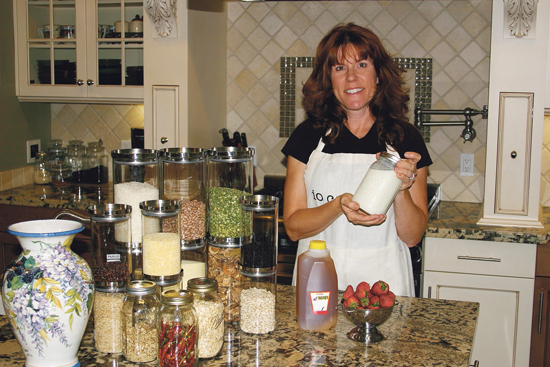 | | | Nanette Hefferman in her kitchen with a few of the bulk food containers she takes to the store. She is holding a jar of homemade yogurt sweetened with local honey and fresh berries from her garden. Photo provided
| | | | | | Of the 3R's of sustainable life-Reduce, Reuse, Recycle-Nanette Hefferman's favorite is the first one: the new challenge the mother of three little children set for herself is to have a zero-waste kitchen. Recycling is not enough for the woman who is skeptical about the reality of the process and does not believe it solves any problems. But as she discovered, it takes ingenuity and time to live trash-free in a world that, in the name of convenience, packages everything extensively.
 "The first reason for this decision is that, according to the EPA, packaging is the largest category of waste, making up 30% of municipal waste," says Hefferman, "that's a huge opportunity." Packaging also encourages the sale of non-durable goods, plastics and junk. She believes that the best solution to our growing trash pile is not to waste in the first place, "Recycling has a down side; it justifies the waste," she says.
"The first reason for this decision is that, according to the EPA, packaging is the largest category of waste, making up 30% of municipal waste," says Hefferman, "that's a huge opportunity." Packaging also encourages the sale of non-durable goods, plastics and junk. She believes that the best solution to our growing trash pile is not to waste in the first place, "Recycling has a down side; it justifies the waste," she says.
 Hefferman thought that the kitchen, the number one place for creating trash in the home, should be the first place for starting living waste-free. With her vegetable garden and her chickens, a nice percentage of the food she puts on the table comes totally free of any kind of packaging. But she still has to shop for many things. Hefferman started looking at where she was doing her shopping with a different perspective. "When you want to eliminate packaging you have to stay away from processed food," she says, "you have to shop the perimeter aisles, it eliminates a lot of problems."
Hefferman thought that the kitchen, the number one place for creating trash in the home, should be the first place for starting living waste-free. With her vegetable garden and her chickens, a nice percentage of the food she puts on the table comes totally free of any kind of packaging. But she still has to shop for many things. Hefferman started looking at where she was doing her shopping with a different perspective. "When you want to eliminate packaging you have to stay away from processed food," she says, "you have to shop the perimeter aisles, it eliminates a lot of problems."
 But to fully solve the waste=0 equation, Hefferman had to go beyond the 'bring your own bag' slogan to the 'bring your own container' scheme. "Many stores now sell washable, reusable produce bags that can easily be used instead of the plastic ones," says Hefferman, "and for the rest, I shop bulk and bring my own jars." When Hefferman goes shopping to one of her favorite Lafayette grocery stores, she gets her containers weighed. Whole Foods says it encourages customers to bring their own containers, "Just bring your jars to the customer service station, we'll weigh it and put a little sticker on it, and the cashier will deduct it when you check out," said a Whole Foods employee.
But to fully solve the waste=0 equation, Hefferman had to go beyond the 'bring your own bag' slogan to the 'bring your own container' scheme. "Many stores now sell washable, reusable produce bags that can easily be used instead of the plastic ones," says Hefferman, "and for the rest, I shop bulk and bring my own jars." When Hefferman goes shopping to one of her favorite Lafayette grocery stores, she gets her containers weighed. Whole Foods says it encourages customers to bring their own containers, "Just bring your jars to the customer service station, we'll weigh it and put a little sticker on it, and the cashier will deduct it when you check out," said a Whole Foods employee.
 Maintaining her kitchen demands advanced organizational skills, but Hefferman calculates that it is worth the effort, even from a budgetary perspective. "Buying bulk and preparing things yourself can save up to 80 percent of the price of food," she says. "Beans are a great example-dry beans cost a fraction of those in cans. I also make our yogurt, which costs just a few cents." Other items, such as flour, are not much less expensive bought in bulk. She estimates that in the summer, her grocery bill is cut in half, because the family grows a lot of its own produce, and the overall amount of their recycling has also gone down by 50 percent. "For me buying bulk is a way of life," says Hefferman, "my kids eat better and their food never comes out of plastic containers or bags."
Maintaining her kitchen demands advanced organizational skills, but Hefferman calculates that it is worth the effort, even from a budgetary perspective. "Buying bulk and preparing things yourself can save up to 80 percent of the price of food," she says. "Beans are a great example-dry beans cost a fraction of those in cans. I also make our yogurt, which costs just a few cents." Other items, such as flour, are not much less expensive bought in bulk. She estimates that in the summer, her grocery bill is cut in half, because the family grows a lot of its own produce, and the overall amount of their recycling has also gone down by 50 percent. "For me buying bulk is a way of life," says Hefferman, "my kids eat better and their food never comes out of plastic containers or bags."

|
